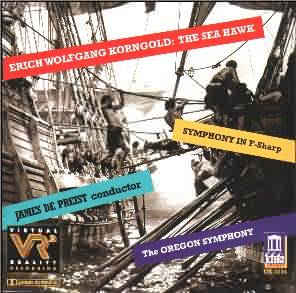Music Webmaster Len Mullenger |
||
Music Webmaster Len Mullenger |
||
Erich WOLFGANG
KORNGOLD Symphony in F sharp;
 The Sea Hawk Suite Oregon SO conducted
by James De Preist The Sea Hawk Suite Oregon SO conducted
by James De Preist DELOS DE3234 [62:00] DELOS DE3234 [62:00] |
|
|

My introduction to Korngold's music came with the two Gerhardt RCA volumes of film music in the early/mid 1970s. I particularly enjoyed the music for The Sea Wolf. The over-ripe violin concerto always seemed to be too much of a good thing whether in Heifetz's hands or Hoelscher's. Later I heard the RCA LP of the symphony and was totally won over. Over the years I have heard various performances of the symphony (not the recentish Previn and Welser-Most ones) but none has moved me as much as the present one.
I am a great supporter of de Preist and am fascinated by his Shostakovich symphonies and his restraint in not rushing to record all of a composer's symphonies immediately. The results of taking each recording as an isolated event yield high dividends.
The Sea Hawk mini-suite (three movements) has all the confidently over-blown romance and derring-do we must expect and relish in this performance. Never has the music emerged with such immediacy, sonic splendour and all-conquering sweep. I say this against the background of Charles Gerhardt's full-blooded recording from RCA/BMG. Ultimately however this is a filler-make-weight for the major work.
Comparison in the case of the symphony is difficult given the differences in various couplings. Kempe (RCA) offers the symphony alone. Downes and Chandos have the Abschiedslieder, CPO and Albert have Straussiana and Theme and Variations - both lighter-weight dance confections for US universities. The Kempe is the oldest recording dating from 1972 and using analogue masters. The others are all digital recordings. Rather than listening to every version all the way through I have played the second movement scherzo of each version available to me and taken that as a touchstone. Kempe despite labouring with an analogue original brings out a considerable
brightness and delicacy but the recording does not have the immediacy of the Delos version. It is however extremely impressive as might be expected given George Korngold's control of the project. George also oversaw the RCA classic film score series with notable results (listen to the Korngold, Waxman and Herrmann albums!). In any event the Kempe must be regarded as a historic performance in what is certainly extremely good sound. The CPO dates from 1988 but its digital sound is subtly shallower than the Delos and Chandos in a work which needs an expansive deep bass. The trumpets are not so rich nor is the horn section so sharply defined. By contrast Albert's xylophone leaps startlingly into the foreground. The Chandos is typically rich and there is razor-sharp definition to string and woodwind which in the scherzo sound a little hurried. The horn theme in the scherzo unfolds nicely but the wilder shudders in the horns are not captured as well as they are on the Delos.
All in all the choice is between De Preist and Downes. Either will satisfy. Both project the symphony with conviction. De Preist is all-conquering in the scherzo and Downes is marginally to be preferred in the finale which he holds together more effectively. The Delos recording is superior in definition to the Chandos the richness of which occasionally obscures details which emerge with affecting transparency in the Delos.
Do try the second movement of the symphony to compare approaches and sound. De Preist and the Oregon SO give an all-out performance and the horn section is wondrous but then again they have a superb tragic-heroic theme to project. Absolutely glorious. I was quite happy to listen to this work as a symphony. Easy references to film music can be made but only distract from a monument of late-late-romanticism. Bax may occasionally be echoed by Korngold - more than you might guess (try the slower sections of the second movement). As for Richard Strauss and Wagner I heard little if anything of them in the music. Instead we find Korngold confident and
perhaps happy writing a symphony which gives every sign of conviction and of a compulsion to be written. A pity he never completed the second symphony. Is it salvageable?
Attractive design and superbly authoritative notes (monolingual) from biographer Brendan Carroll complete the picture. The Delos is highly recommended. If you have not discovered the Korngold Symphony yet don't delay. HEALTH WARNING: I have not heard the Welser-Most and Previn
recordings so you may wish to compare these as well.
Comparative timings:-
Moderato Scherzo Adagio Finale
Kempe 14:12; 9:14; 15:04; 10:19
Downes 14:14; 10:14; 16:28; 10:24
De Preist 15:20; 10:33; 16:57; 11:04
Albert 16:15; 10:00; 15:05; 10:33
![]()
Rob Barnett
see also Errol Flynn net John DeBartolo
Return to September Film Music Reviews